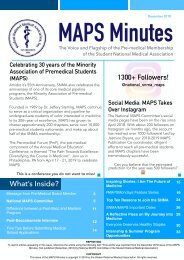JSNMA SUMMER 2019 Sneak Preview
You also want an ePaper? Increase the reach of your titles
YUMPU automatically turns print PDFs into web optimized ePapers that Google loves.
34 Scientific Focus<br />
Table 1. Workshop Attendees’ Self-Reported Demographic Information<br />
Demographic Category<br />
Gender Identity<br />
Number of<br />
Participants (N)<br />
Percentage of<br />
Participants (%N)<br />
Male 4 20<br />
Female 15 75<br />
Genderqueer/Non-binary 1 5<br />
Education Level<br />
Undergraduate 5 25<br />
Graduate 15 75<br />
Generational Affiliation<br />
Baby Boomers: Born from 1945-64 3 15<br />
Gen X: Born from 1965-80 2 10<br />
Gen Y/Millennials: Born from 1981-96 15 75<br />
Political Affiliation<br />
Democrat 14 70<br />
Republican 0 0<br />
Independent 3 15<br />
Missing or Decline to comment 3 15<br />
Racial/Ethnic Identity<br />
Black 2 10<br />
Asian/Pacific Islander 2 10<br />
White 15 75<br />
Multiracial 1 5<br />
Religious Identity<br />
Christian 5 25<br />
Roman Catholic 3 15<br />
Buddhist 1 5<br />
Atheist 2 10<br />
Spiritual (not Religious) 6 30<br />
Current Profession<br />
Student 5 25<br />
Nurse 3 15<br />
Physician 9 45<br />
Social Worker 3 15<br />
Table 2. Reported Pre-Test Means Data for Diversity Training<br />
Survey Question Mean Score (Range 1-5) Std Dev<br />
How many hours of specific<br />
training did you receive on<br />
addressing racism during<br />
your official matriculation?<br />
1.6 (1-4),<br />
Roughly translates to<br />
~2-5 hours<br />
1.231<br />
The pre-test questionnaires offered insight into the<br />
participants’ prior exposures to diversity training and<br />
racial traumas. Hours of training specific to addressing<br />
racism was almost equally split between having<br />
either 0-3 or 3-5 hours. On average, the frequency of<br />
experiencing racism in the clinical setting was rated<br />
between “occasional” (score of 3) and “frequent” (score<br />
of 4) with a mean score of 3.59 and a total range<br />
between 2.6 and 4.4.<br />
Additionally, the pre-test showed that the participants’<br />
reported comfort in addressing racism with a patient<br />
of a different racial identity differed significantly by the<br />
racial and generational identity of the participants, and<br />
also the reported feeling of importance in addressing<br />
racial trauma in clinical practice varied by their<br />
generational affiliation and religious identity. Differences<br />
in response to whether or not participants encountered<br />
racism in their clinical practices could be found across<br />
professional titles and between the White and non-<br />
White racial identities.<br />
Following the presentation and group discussions,<br />
post-test data demonstrated variance in comfort with<br />
the concept of empathy by income, gender, race,<br />
and religious identity. Comfort using DEAR MAN<br />
skills differed by income, race, and profession; while<br />
participants’ assessments of the likelihood for future<br />
incorporation of the techniques varied by gender and<br />
religion.<br />
Table 3. Pre-Test Summary of Significant Values: Means Data, ANOVA Analysis of Multivariates, and t-test Sampling of Independent Binary<br />
Variables<br />
Survey Question<br />
How often do you encounter racism in your<br />
clinical practice?<br />
How familiar would you say you are with<br />
your concept of racism?<br />
How important do you feel it is to address<br />
racial trauma in clinical practice?<br />
How comfortable do you feel addressing racism<br />
with a patient/client of a different racial<br />
identity?<br />
Mean Scores<br />
(Range 1-5)<br />
Std Dev ANOVA by Group (p-value) t-test Sample by Group (p-value)<br />
3.59 (1-5) 0.939 Generation (0.049) and Profession<br />
(0.081)<br />
White vs non-White (0.088)<br />
4.00 (3-5) 0.745 Race (0.072) --<br />
4.80 (1-5) 0.894 Religion (0.086) and Profession<br />
(0.089)<br />
2.85 (2-5) 0.813 Generation (0.081) and<br />
Race (0.035)<br />
--<br />
--<br />
J o u r n a l o f t h e S t u d e n t N a t i o n a l M e d i c a l A s s o c i a t i o n






